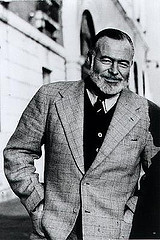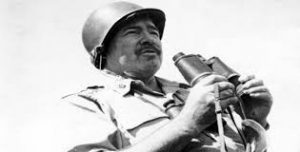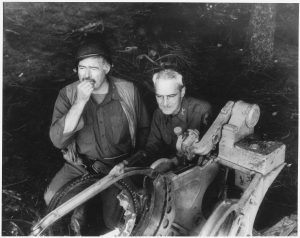Happy Saturday morning, all Hemingway readers. A new story has been found and published from 1956, 5 years before Hem’s death. Hemingway of course did not feel it was finished so please keep that in mind but i can’t wait to read it. Hope your summer is going fantastically! i added photos.Best wishes, Christine
You can finally read this Ernest Hemingway story about Paris after WWII
On Aug. 14, 1956, Ernest Hemingway wrote to publisher Charlie Scribner about five short stories he had written: “I suppose they are a little shocking since they deal with irregular troops and combat and with people who actually kill people….Anyway you can always publish them after I’m dead.”
More than six decades later, fans can finally read one of the long-unpublished stories.
“A Room on the Garden Side” centers on a fictionalized version of Hemingway at the Paris Ritz Hotel toward the end of World War II, and is punctuated with books, liquor, soldiers and a love of Paris — all familiar trademarks.

The Hemingway Estate granted publishing rights to The Strandquarterly literary magazine in last October.
“With a precious little gem like Ernest Hemingway, you don’t ask any questions,” managing editor and Hemingway aficionado Andrew Gulli said. “You just count yourself fortunate that you get the chance to publish something by one of the greatest writers in the 20th century.”

The 3,000-word story is narrated by Robert, or “Papa,” a clear representation of Hemingway himself, with a sense of pathos for times gone by and the sacrifice of soldiers. It quotes heavily from the poem “Les Fleurs du Mal,” by Charles Baudelaire, charging the story with poignancy over the ways the city of Paris was changed by the war.
“It has some of his favorite themes,” Gulli said. “What I really found interesting is there is some humor and laughter and the talk of people who just won a battle, but beneath that you see a sadness for the people that died during the conflict.”

Hemingway wrote “A Room on the Garden Side,” more than a decade after WWII, a conflict during which he had served as both reporter and unofficial soldier. Only one other story in the quintet he wrote in 1956 was previously published, according to Kirk Curnutt, board member of The Ernest Hemingway Foundation and Society.
“In 1944 when he is one of the first Americans into Paris on the day of the liberation, it is a very profound moment for him — for reclamation of freedom, but also the reclamation of a city that was stolen from him as well,” Curnutt said.

“A Room on the Garden Side” takes place just after the liberation of Paris at the end of the war, where Robert and a ragtag group of “irregulars” — members of the French resistance — sit drinking and reminiscing with the famous Charley Ritz in his namesake hotel on the Right Bank of Paris. The Ritz was Hemingway’s favorite hotel away from home throughout his life.
Scholars like Curnutt have known about the story — 15 handwritten pages — for some time. (It has been housed at the Library of Congress and John F. Kennedy Presidential Library and Museum in Boston.) But this is the first time the story will be published for the wider public.

“[The Estate has] steered away from commercializing anything unpublished,” Gulli said. “They were very kind to give the story to The Strand because they understand we have a good track record of publishing unpublished works. They want to make sure that if something is released that it will honor the memory of Ernest Hemingway.”
The magazine, and Gulli in particular, have tracked down and published similarly overlooked works by the likes of John Steinbeck, Tennessee Williams, F. Scott Fitzgerald, H.G. Wells and Mark Twain. “A Room on the Garden Side” is being solely published in print, not online.

“To me it’s not like Hemingway is an unknown writer and that this will bring him back into competition,” Gulli said. “It’s more of the passion to have a writer that you’ve admired and revered your whole life and to get it published in Strand magazine — it’s a wonderful feeling to know Hemingway is gracing our pages.”
